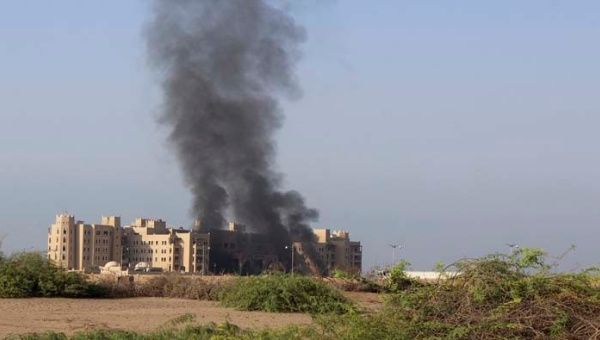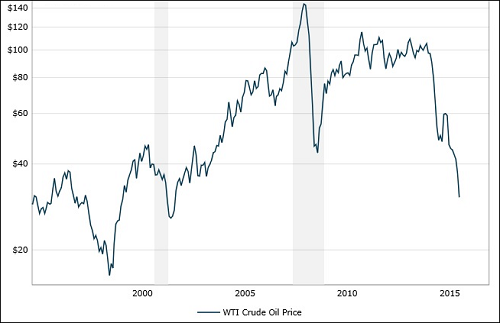Much coverage of the Greek debt crisis has focused on the ‘troika’ of international creditors and German chancellor Angela Merkel – a striking image of parasitic foreign powers scapegoating the country for personal gain.
In some corners of the Left, this narrative has fueled the demand for ‘Grexit’ (a Greek exit from the eurozone) under the impression that such a move would create a more favorable environment for a break with austerity. This animated the Left Platform’s disagreements with Syriza’s bargaining-table approach and their later metamorphosis into Popular Unity.
Jannis Milios, once Syriza’s chief economic adviser, aligns neither with Syriza nor with Popular Unity. He views Syriza’s current program as a reversal of its original radical one. Yet his alternative to Greek president Alexis Tsipras’s approach is not Grexit, but a confrontation with Greece’s domestic capitalists. Athens-based journalist Alp Kayserilioğlu recently sat down with Milios to discuss the history of Syriza, the purpose of the eurozone, and the power of the country’s domestic bourgeoisie.*
Alp Kayserilioğlu (AK): How would you characterize Syriza, and how would you explain their swift rise the last years, which culminated in their election to government?
Jannis Milios (JM): To understand the situation of the Greek left today, you have to look back into history. There was a big split in the Communist Party of Greece (KKE) in 1968. One part of the KKE, the so-called KKE Interior, more and more developed into a very pro–status quo, conservative Eurocommunist party while the other, KKE, over time turned into a post-Stalinist, pro-Moscow communist party.

A dockworker in Greece. Vagelis Poulis / Flickr.
But both shared similar reformist and gradualist thoughts on making Greece “less dependent” through more economic growth (of Greek capitalism, of course), which was conceived as a transition phase to an anti-monopolist democracy, before gradually the transition to socialism could be completed.
It is this very shift in their ideological and practical stance that made possible the foundation of Synapismos in 1989, which was originally an alliance of the former KKE Interior (at that time renamed to Greek Left-EA) and the KKE with other non-communist political groups or cadres.
The shift toward these type of alliances explains the decision of both communist parties to join a “caretaker” government under the leadership of Nea Demokratia, or New Democracy (ND) in 1989; that proved to be a disaster since it fully stabilized and legitimized neoliberal ideology and policies.
When the KKE left the caretaker government and Synapismos in 1990, many of its cadres remained, constituting another split in the KKE. That’s when it adopted its massively sectarian and isolationist stance, well-summarized by its old slogan of “Five parties, two policies” (i.e. KKE versus everybody else).
On the other hand, following this split in the KKE and Synapismos, Synapismos was transformed from an alliance into a political party in 1991. Synapismos was then the main driving force in founding Syriza in 2004, initially an alliance of Synapismos with several other political groups of the Left including at least four of the “revolutionary extra-parliamentarian Left.”
After 2004, with the support and strength of these new political organizations, Syriza secured somewhere around 4 to 5 per cent in parliamentary elections (half as much as KKE). They became more and more involved in the movements. The majority of its members were radicalizing, adopting the radical left’s political positions.
In 2006 they played a decisive role in the struggle of students against the privatization of the universities. In December 2008 when Alexandros Grigoropoulos was murdered [a student shot by police in Athens], Syriza was the only major party that didn’t simply condemn the violent mass uprisings that took place afterwards, but raised the question about the causes of the unrest. And Syriza was attacked for this non-condemnation, especially from the side of the KKE.
However, the major turning point was the square movements. Around 25 to 33 per cent of the population across Greece joined these movements from March 2011 to February 2012. That was the movement that tipped the balance in favor of Syriza. Immediately its electoral support rose, first capturing 16.8 per cent of the vote in May 2012, then 26.89 per cent only six weeks later, in June 2012, definitively becoming the second most powerful party.
As for the internal composition of Syriza, while Synapsismos (itself derived from the KKE tradition) constituted their main body, as it approached government in the wake of 2012, a part of its leadership began taking on a social-democratic reformist stance; on the other hand, it attracted members and groups from the alter-globalization movement and the spirit of Genoa 2001.
The latter part gave the coalition a more radical edge. Tsipras himself is a former member of the radical youth organization of Synaspismos, which was an element of the more radical part of the coalition. However, the majority of the Synapismos leadership started to push Syriza toward the center left, especially after the electoral success of 2012; this sped up after the 2014 elections for the European Parliament, and they managed to change Tsipras along the way.
Around the time of Syriza’s 2012 success, internal democratic workings of the party were becoming irrelevant and the leadership more and more took on an autonomous stance. This trend deepened after the elections for the EU parliament in 2014: in these elections, Syriza was the top party with 26.57 per cent of the votes. All the documents that were published in this time, like the programs of 2012, the political resolution of the first congress of Syriza in 2013 and so on, they were just fig leafs hiding the center-left turn of Syriza’s leadership.
AK: One can discern the change in the documents themselves. The resolution of the first congress of Syriza in 2013 expresses the party’s two souls: it talks about socialism of the twenty-first century, but also about a mixed economy, productive reconstruction, and so on.
JM: Yes, yes, exactly. A part of the Syriza leadership had already made compromises with the Greek bourgeoisie; people like [Deputy Prime Minister] Yannis Dragasakis cared about being portrayed in mass media as responsible guys who care about productive reconstruction and competitiveness of the economy (i.e. of Greek capitalism). And Syriza began flirting with center-left politicians and small center-left parties like Dimar, a former split from Syriza.
And the ideological shift that took place within Syriza is exactly how you described it: slowly the main focus shifted from wealth redistribution, taxing the rich, building up a social economy, and so on toward more supposedly neutral terms like growth, productive reconstruction, combating the humanitarian crisis, etc. that portrayed the society and the economy as something where we all share the same interests and where we aren’t divided along class lines.
All these political and ideological shifts manifested themselves in the Thessaloniki Program of September 2014, which dropped many of the original demands and slogans of Syriza and was deprived of anything that could’ve been understood as anticapitalist.
By December 2014 – before Syriza became the government – I had already decided not to participate in the elections or in the Syriza government that was going to be formed. I made my decision public on December 31, 2014, and when Tsipras called me one day after the elections in January 2015 and told me that he had good portfolios to offer me I thanked him and repeated my arguments about why I had decided not to be a minister in the new government.
I hoped that by staying out of the parliament and the government I could more effectively influence the party’s base to resist this shift from the party’s original radical program.
What I mean is that when Syriza became the government the shift had solidified. They were playing the lesser-evil game, a new memorandum with less austerity and more room to make decisions. Yanis Varoufakis accepted 70 per cent of the memoranda – whatever that means – right after becoming finance minister and signed a preliminary agreement on February 20 that inscribed a continuation of the logics of the memoranda.
Syriza then put forward its supposed red lines as a fig leaf to conceal the compromises they made: maintenance of the existing neoliberal framework as it had been shaped in the four years of austerity memoranda though without any further reductions of wages and pensions, hikes in the VAT, insisting on ending the humanitarian crisis and so on.
In the process of the negotiations and with the third memorandum in July 2015 most of those “red lines” were completely cast aside, but the rhetoric of “we fought with all our forces but were defeated by a stronger enemy” could be retained in a plausible manner.
And Tsipras was reelected in September 2015 precisely on the grounds of him being able to convince the people of the notion that he had fought hard and that he is the lesser evil, that he follows the austerity memoranda only because he was beaten by stronger foreign forces.
I actually do think that we have better chances of reorganizing again as long as people voted for Tsipras and Syriza thinking “at least we have kept the really bad outside.” Because with time, as they see that Syriza is doing exactly what every other party since the memoranda also did, they will intensify the struggle against the neoliberal austerity framework and the state, since they will see that even the lesser evil is evil enough.
AK: And what do you think is to be done now after the complete defeat of Syriza? To me there seems to prevail a spirit of resignation and surrender.
JM: What we need to do now is to start from the beginning. We are now in a situation as it was, let’s say, around 2000. We need to reconstruct an alternative from below and any idea of a progressive left government is at the moment, because of Syriza, dead. We need completely new and different slogans and different ways now to begin again. We cannot use the old concepts, methods, and slogans – they just won’t work anymore.
AK: So you don’t think that the new party, Popular Unity, is going to succeed?
JM: Yes indeed, I think that’s precisely why they haven’t succeeded so far and won’t succeed in the future. You know, my main problem with Lafazanis, Lapavitsas, and LAE is that they are way too similar to Syriza in its “original,” more radical form, with the addition of the focus on exiting the eurozone and/or the EU.
Lafazanis does the same as Tsipras did: he has this style of “vote me into government and I will solve the problems” instead of shifting the focus toward “look, you people should fight and I will assist you in your struggles.” It’s this classical étatist or governmentalist stance of the traditional Greek left.
On the other hand, Greeks, despite the crisis, have some wealth in form of deposits, cars, apartments, and the like, and they naturally fear a devaluation of a new currency if Greece would quit the eurozone. People won’t go for a straightforward exit of the eurozone, which is a very difficult venture if they don’t see why they should do so.
Our main tactics and our focus should not be on the question of the eurozone and the EU but on an anticapitalism that is based on developing methods of self-management of the people. We can only pose the question of leaving the eurozone or EU if it’s based in constructing alternative modes of self-management and economy that have an anticapitalist drive.
If we see that while engaging in our anticapitalist struggles the eurozone and the EU become a fetter, then we can pose the question of leaving both. But we shouldn’t do it the other way round as LAE does – that is, to first pose the question of exiting the eurozone (in order to supposedly promote “growth”) and then caring about the social struggles and a possible anticapitalist edge of the same.
There is this obsession with exiting the eurozone and/or EU and rescuing Greece within this part of the Left. This, however, is because of a peculiar and persistent patriotic trend within the Greek left. In the two phases of the Civil War (1944–45 and 1946–49), the Left, including the National Liberation Front (EAM) and the Greek People’s Liberation Army (ELAS), claimed to be more patriotic and authentic Greeks over their collaborationist and monarchist opponents. This was emphasized more than their communist or socialist identity.
They saw Greece as a dependent colony that is kind of colonially exploited by imperialism and has to be rescued from the fetters of imperialism and colonialism first so as to then, some day, go forward toward socialism. This kind of patriotic left identity continues to have a strong effect today.
AK: Pasok came out of former Prime Minister Papandreou’s Panhellenic Liberation Movement (PAK), a organization resisting the military dictatorship. PAK saw Greece as an “industrial and military satellite of the USA” under “neocolonial domination,” necessitating an armed anti-imperialist national liberation movement.
JM: Exactly! That’s what I’m trying to tell you. To name a characteristic example, you have Markos Vafiadis, an old ELAS chief commander, a communist, who was an MP of the old “radical” Pasok, which was stuck on this national liberation discourse that neglected domestic class antagonisms – and Greece was in a time of massive capital profitability and growth.
It is this tradition of Greek left-wing patriotism which continues today when, for example, Lafazanis keeps talking of Greece as a debt colony or of Germany alone dominating Greece and similar things. In reality the EU ascension process was a strategic choice of the dominant factions of Greek capital to upgrade and reinforce their own position domestically against labour and internationally in the international division of labour.
The institutional framework of the EU and the eurozone should be understood as a framework that enforces neoliberalism for the sake of the collective capitalists of all the countries that join these frameworks instead of as a mere colonial project of Germany or whatever.
AK: I get your point. But don’t you think that there is some kind of a material basis for an argument concerning very unequal power relations between Greece and Germany within the EU? That Greece as a minor imperialist or sub-imperialist power is dependent in ways Germany, as a major imperialist power, is not?
Greece did lose much of its agricultural and industrial basis in the EU ascension, which makes it very vulnerable. You can cope without importing solar cells from China for some time, but you can’t cope without importing food if your economy is dependent on this – which is the case with Greece. This was obviously used as leverage against the Syriza government.
JM: Well of course Greece is a small country compared to Germany, but what is the big difference between Greece and other small countries in the EU like Denmark or Finland? There was indeed a major deindustrialization process, but that happened across European countries.
Greece’s strong industrial sectors are oil processing, petrochemicals, pharmaceuticals, and basic metals. Apart from that Greece has restructured into a capitalist service economy focusing especially on shipping, tourism, software, and lottery. Did you know that Greek ship owners possess more than 20 per cent of the world’s tanker commercial fleet? We do have big capitalists in Greece.
AK: OK. So what do you say should’ve been done under Syriza?
JM: They should’ve focused on changing social relations inside Greece. First of all start taxing the rich, make them pay for their massive profits, which they fully protect through low taxes, tax exemptions, and tax evasion. Then stop the payments to the troika and tell them: “Sorry, but we can’t pay right now. You are not giving us the tranches you owe us. So how can we pay you back? Let’s see if we can after we have managed our economy. Until then, no payments.”
Contrary to popular opinion I don’t think that this would’ve been classified as default. Standard and Poor’s, among other rating agencies, even said that they wouldn’t classify such a move by Greece as an act of default. Third, start installing capital controls before a bank run occurs, so as to stop capital from fleeing the country or any other actions that would destabilize the economy.
AK: Well don’t you think that exactly these kind of moves would’ve induced a very strong reaction by the Greek bourgeoisie and the EU at the same time? Wouldn’t being prepared to battle the EU then also be a part of fighting the Greek bourgeoisie itself? And shouldn’t a left alternative seek to reconstruct parts of Greece’s agricultural and industrial potential to reduce unequal dependence?
JM: Of course it would’ve induced a very strong reaction by the EU, and yes, that fight would also entail fighting the Greek bourgeoisie. I just say focus on the class relations within Greece.
We should have done a radical left, Jacobin-style politics: throw in anything you got, issue IOUs if necessary, terrorize the bourgeoisie with taxes, capital controls, whatever means you can mobilize. And all the while foster workers control in the workplaces, build up closed cooperatives, and so on.
And of course we need to reconstruct our agricultural and industrial potential, but with the workers and citizens initiatives playing a decisive role in it. But this again is also partly a struggle that is to be fought primarily within Greece.
For example look at the agricultural land. Banks by now possess so much agricultural land because of farmers that went bankrupt. You should go and seize those lands and give them to big cooperatives under workers control and reconstruct the agricultural potential and also the industrial potential in this manner.
And within this framework of a clearly class-based politics, changing social relations within Greece, you confront the pressure by the EU and if necessary announce a referendum on the relation with the eurozone and/or the EU. It would’ve been better to go on the offensive as I just outlined and fail and be voted out of office again than to not have even tried out your own way.
“
While you still operate within capitalism, you use the state as a means of doing class politics and strengthen labour in the economy and society. I do think that there are only two systems – capitalism and communism – but there is no simple hop between them. ”
That means that while you still operate within capitalism, you use the state as a means of doing class politics and strengthen labour in the economy and society. I do think that there are only two systems – capitalism and communism – but there is no simple hop between them. You have an in-between that is socialism, which is a mixture of capitalism and communism.
I mean, just look at the Soviet Union or the struggle of the Left in Latin America. If Syriza would’ve followed what I just proposed, they would’ve arrived at a compromise within, of course, the capitalist system but one which would have had a much stronger position and counter-hegemony of labour on which you could base yourself to push ever more forward. You need to go for a process of constantly revolutionizing social conditions to achieve communism – there is no single hop.
Anyway, the point with Syriza was that it followed the typical social-democratic rationale according to which workers and capital have some common interests like growth, productive reconstruction, and so on, and that’s why they didn’t go on the offensive. Which, I think, would have been possible.
Just look at the massive street participation with the referendum of July 5. And then again the vote was clearly divided along class lines: you would often have an “oxi” of around 70 to 80 per cent in working-class quarters and a “nai” around 70 to 80 per cent in the quarters of the bourgeoisie. It was clearly a class-based referendum, and you could see the mass potential for engaging in a social offensive in the inland.
AK: Don’t you also think that one of the major problems of Syriza was its conception as a classical bourgeois party? That is to say: the party represents the popular will in the parliament while the movements make a little noise on the streets to support the struggle of the parliamentary party – unlike the Bolshevik party model of a fighting party that in the first instance takes part in the forefront of all progressive social struggles to push them forward and uses the parliament only as a tribune or tool?
JM: Exactly, that’s the classical governmentalism of the Greek left. I’d add to this what I’d call the rationalist chimera. They really thought that the issue was one of epistemological mistakes; that the troika, the EU, etc. made mistakes and could be convinced by rational arguments to do the right thing.
Syriza completely misunderstood that austerity is all about strengthening capital and that there is no “right” or “wrong” in this but class interest. And from this point of view, Varoufakis clearly was a very good choice as finance minister.
On the one hand he was already a semi-neoliberal guy. You remember he said that “we agree with 70 per cent of the reforms or commitments that have already been laid out in the memorandum” once he became finance minister. But then again he had that “radical communication style” that made it look as if Syriza was putting up a really serious fight, which was their main argument when they accepted the third memorandum: “we tried our best, but they were too strong.”
AK: In one of your essays, you say that counting on Russia and China is political exotism or wishful thinking of the extreme right wing. What exactly do you mean by that? If you ask me, I’d go for closer relations with Russia and China if I were in government. Not because I find either of them sympathetic – on the contrary – but because I’d need to substitute the trade relations with other European countries, which would probably break apart due to the conflicts our radical class-based program would create with the EU.
JM: But I’d still need to import very important goods as long as I haven’t reconstructed my agriculture and industry. And I think it’s a good idea to build trade relations with capitalist countries that are hostile to the EU bloc; they’ll give you better trade conditions because they also have an interest in harming the EU bloc. I’d of course also go for closer relations with Venezuela and Cuba, for on top of the aforementioned arguments they’re also ideologically and politically much closer to my alternative.
On Venezuela, as an example among others, I’d agree. Concerning Russia, apart from it being a very conservative and imperialist power which makes any closer relations rather difficult from my point of view, I think that it has very sensitive relations with the EU and Germany and can’t risk harming them more. The EU is a very big player and nobody, not even China, would want to go into direct confrontation with it.
Also I think that the central issues are not the trade relations but finance. It’s the banks that are your Achilles heel, not trade relations. But concerning trade relations, I’d say that trade with Russia and China could only help out in the short run. They won’t substitute for trade relations with EU or other advanced economies.
What is true is that, for example, the port of Piraeus is one of the best in the world, and it has a comparative advantage of five to six hours versus Italian ports in international transportation of goods to central and northern Europe.
With the planned Chinese investment this would rise to two to three days. But then again the problem with the Chinese investment into Piraeus is that it will be privatized to Chinese entrepreneurial interests, instead of being restructured on a public and cooperative basis. Again, something you wouldn’t prefer to do as a left alternative in power.
Concerning me calling a perspective on Russia and China political exotism and wishful thinking of the extreme right wing: this has something to do with political matters and conflicts in Greece. On the one hand you have the fascists of the Golden Dawn. They are connected with Russian far-right forces and thus speak in favor of Russia. Contrary to most of their European peers they, for example, are not at all supporting the Ukrainian fascists but are strongly on the side of Russia.
On the other hand you would have some people who still think that the Soviet Union continues to exist, i.e. Russia is an anti-imperialist power that by definition will support left or democratic governments or political parties in Western Europe. This I do not find a serious argument.
Alp Kayserilioğlu is a freelance communist journalist in Greece. Jannis Milios is Syriza’s former chief economic adviser.

 My whole career, I’ve defended Haitians against the wrath of empire. I don’t want to see what the OAS, the UN and CORE group are about to do in Haiti to get their way to preserve Michel Martelly’s unilateral decrees and land giveaways to foreigners these last five years. Empire wants Haiti lands, islands, strategic position, deep water ports, rare iridium, its gold and underwater riches. They have the racist colonial narrative, billions of dollars they’ve siphon off the world’s poor they oppress and weapons to terrorize the planet. I write today to remind everyone that for five years, since 2011, Haitians peacefully demonstrated against Michel Martelly’s rule. In this last year, they’ve stopped his fake elections. Empire is livid. They won’t let go.
My whole career, I’ve defended Haitians against the wrath of empire. I don’t want to see what the OAS, the UN and CORE group are about to do in Haiti to get their way to preserve Michel Martelly’s unilateral decrees and land giveaways to foreigners these last five years. Empire wants Haiti lands, islands, strategic position, deep water ports, rare iridium, its gold and underwater riches. They have the racist colonial narrative, billions of dollars they’ve siphon off the world’s poor they oppress and weapons to terrorize the planet. I write today to remind everyone that for five years, since 2011, Haitians peacefully demonstrated against Michel Martelly’s rule. In this last year, they’ve stopped his fake elections. Empire is livid. They won’t let go.





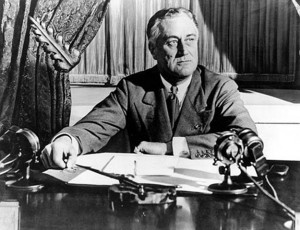


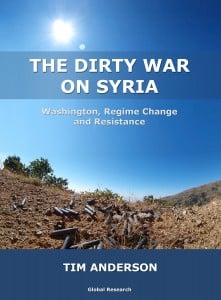
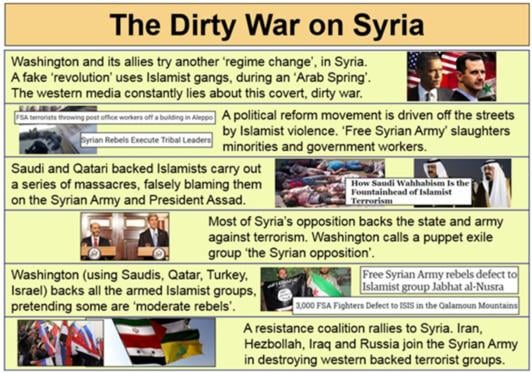


 If there’s an outbreak of Albanian- or ISIL-affiliated terrorism around the same time as the early elections and predicted “opposition” protests, then the country might risk being thrown into turmoil. The US understands this very well and could facilitate this grand scenario for a variety of reasons, but chiefly to obstruct the Balkan Silk Road and Balkan Stream projects. In the event that the “opposition” and/or terrorists carry out some sort of provocation or violent act, it’s highly advisable that the patriotic citizens follow the guidance of their government and avoid being led into any sort of retributive trap. Attacking “opposition” members or ethnic Albanians in response to whatever might happen would only feed into the cycle of violence that the US would want to prompt, whereas allowing the authorities to handle it, as they so adroitly did last year, is the best way to mitigate the US’ chaos-driven plans. However, with or without any sort of disruption around the elections, there’s nothing bad about having large-scale patriotic demonstrations like the ones that took place last May. This would be a very effective way to show the rest of the world, and specifically the audiences that the American and Western media try to mislead, that there is widespread public support for going forth with the elections as scheduled and that the people are eager to end the “opposition’s” political games and return their country’s situation to normalcy.
If there’s an outbreak of Albanian- or ISIL-affiliated terrorism around the same time as the early elections and predicted “opposition” protests, then the country might risk being thrown into turmoil. The US understands this very well and could facilitate this grand scenario for a variety of reasons, but chiefly to obstruct the Balkan Silk Road and Balkan Stream projects. In the event that the “opposition” and/or terrorists carry out some sort of provocation or violent act, it’s highly advisable that the patriotic citizens follow the guidance of their government and avoid being led into any sort of retributive trap. Attacking “opposition” members or ethnic Albanians in response to whatever might happen would only feed into the cycle of violence that the US would want to prompt, whereas allowing the authorities to handle it, as they so adroitly did last year, is the best way to mitigate the US’ chaos-driven plans. However, with or without any sort of disruption around the elections, there’s nothing bad about having large-scale patriotic demonstrations like the ones that took place last May. This would be a very effective way to show the rest of the world, and specifically the audiences that the American and Western media try to mislead, that there is widespread public support for going forth with the elections as scheduled and that the people are eager to end the “opposition’s” political games and return their country’s situation to normalcy.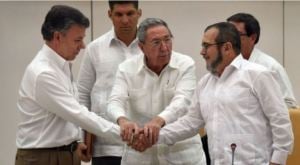

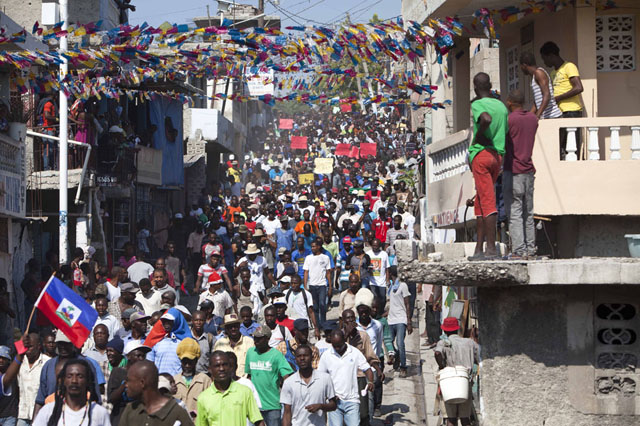
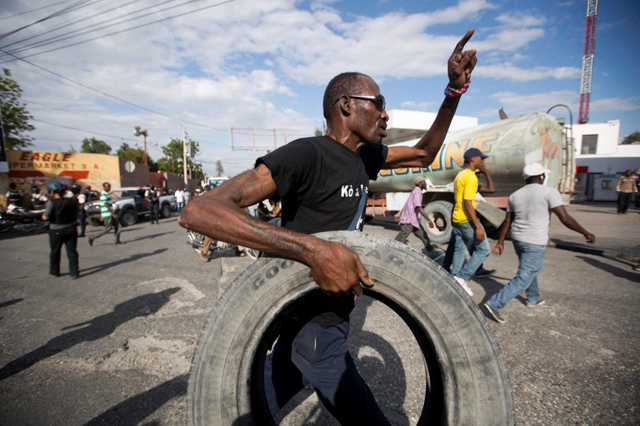
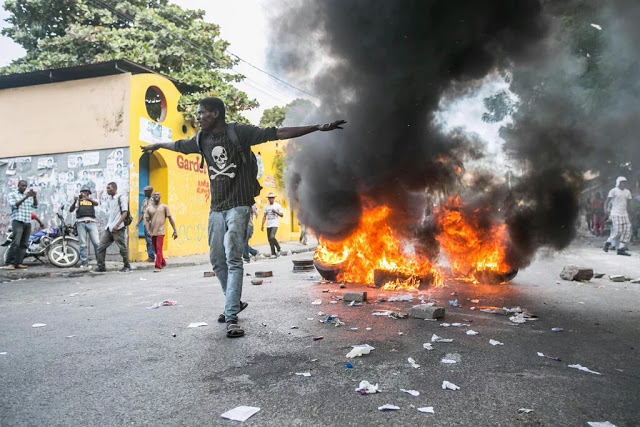
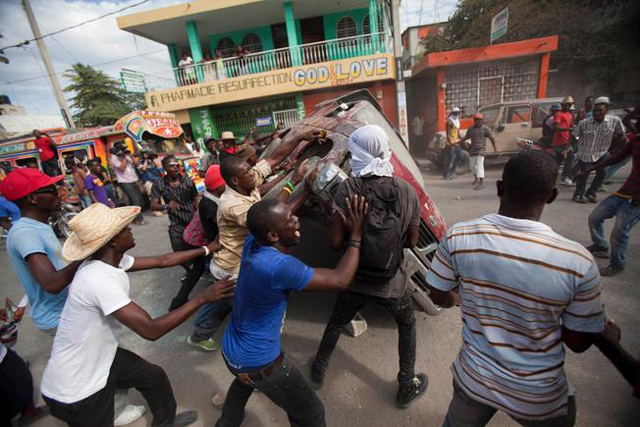
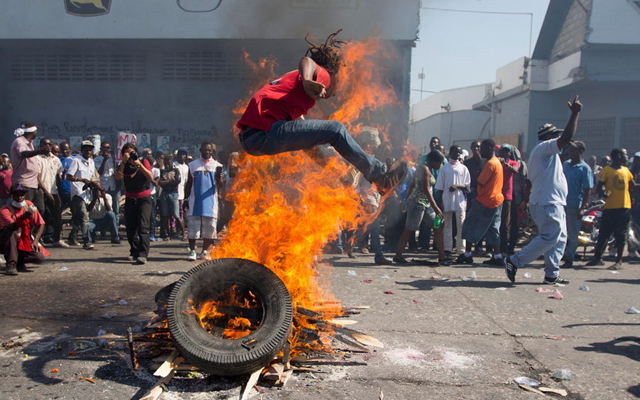
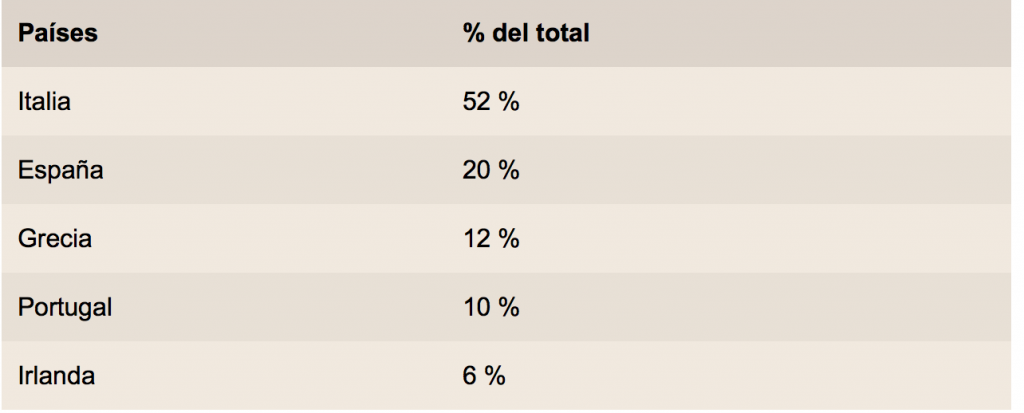
 Eric Toussaint
Eric Toussaint